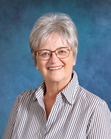Elizabeth J. Duncan's Blog: Elizabeth J. Duncan's Blog, page 4
April 22, 2011
North Carolina, Day 3
After a great breakfast at Molly's, we set off for our event at Flyleaf Books in Chapel Hill, North Carolina. The event was a small, intimate lunch with conversation.

An interesting selection of books

With Molly Weston

Lunch and mystery talk
Inspired by yesterday's visit to Gettysburg, I wanted to buy a basic book about the American civil war. Land, one of the three owners of Flyleaf books, showed me a selection and I chose A Short History of the Civil War by James L. Stokesbury. Prior to his death in 1995 he was a professor of history at Acadia University in Nova Scotia. So it's true that the traveller takes himself with him. My son, Lucas, is an Acadia graduate.
The lunch was catered by Sara Harris Markets and was absolutely wonderful! Happily, Sara Harris is located right next door to Flyleaf Books, so after saying our good byes to our new book friends, we all went next door to buy some fabulous seven pepper jelly.
We returned to Molly's home to re-group and then went out for Southern barbecue for dinner.
This is, after all, the South, and good food is a big part of everyday life.








North Carolina, Day 2
We had arrived in Gettysburg in the evening after a long day on the road, so were too tired to look around. But after a good night's sleep we wanted to see something of the famous civil war site, so visited the Soldiers' National Cemetery. Here at Gettysburg, more than 10,000 died at the famous battle, fought over three days in July, 1863. It is the largest battle ever fought in the Western hemisphere, was the turning point for the American civil war, and it was here, at a dedication ceremony to mark the cemetery which became the final resting place for about 3,500 Union soldiers, that President Abraham Lincoln gave one of history's most famous speeches — the Gettysburg Address — on Nov. 19, 1863.
In a profound testament to the power of brevity, the president followed another speaker who spoke for two hours. President Lincoln delivered his address to the crowd of about 15,000 people in two minutes.

The sign says it all.

Cannons were the weapons of the day

Rows of unmarked graves of unidentified soldiers

Visitors leave Lincoln pennies on the Gettysburg Address plaque

The Soldiers' National Monument honors the fallen

Mary Jane Maffini, left, and Vicki Delany walk through the cemetery
After our visit to the cemetery we walked around the town.

A Gettysburg window with bunting

Arson poster

Got the message?
At mid-morning, we left on the last leg of the journey. We passed through Virginia, and at night fall arrived at the book-filled home of Molly Weston, in Apex, North Carolina, near Raleigh. After a delicious, welcoming supper we fell exhausted into our comfortable beds.








North Carolina book tour, Day 1
One year ago, at Malice Domestic, I was invited to join fellow Canadian authors Vicki Delany and
Mary Jane Maffini on a book tour of North Carolina, organized by media escort and mystery maven Molly Weston. On Wednesday, April 20, we set off. I took an early Via train to Brockville from Toronto where I met up with my partners in crime.
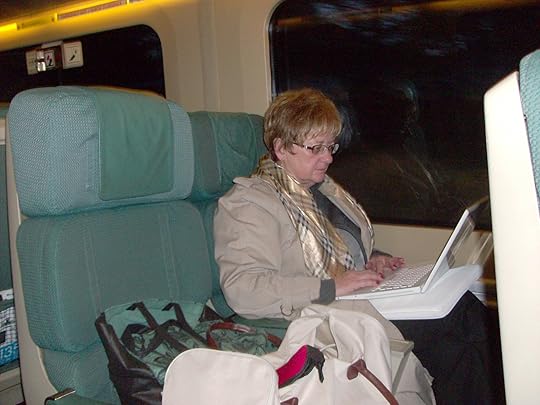
The wifi on Via rail in great
We set off in heavy rain bordering on freezing, crossed the border into the United States and headed south. About an hour after we crossed the border the rain let up and the sun came out. The trees were bare with skeletal black branches. But at Harrisburg, Pennsylvania, spring arrived. The trees were in full leaf and flowering trees, like magnolia, were in full bloom. The pinks, purples and whites were absolutely delightful and the vivid, fresh greens of the foliage and grasses were so welcome after our long, cold Ontario winter.
We stopped for the night in Gettysburg and after settling in, went out for an Italian dinner.
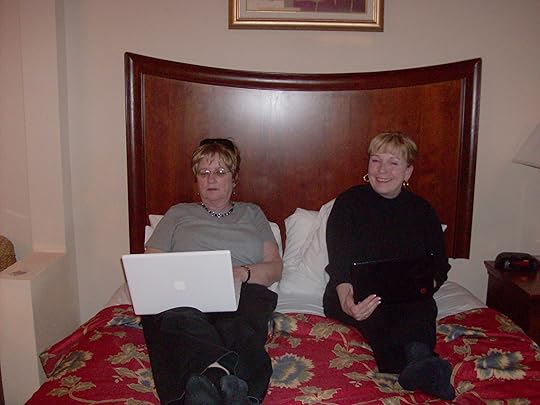
Mary Jane Maffini and I check our email.
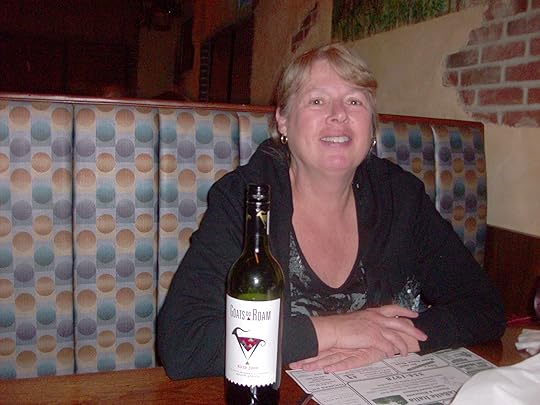
Vicki Delany enjoys a glass of wine at dinner. I liked the name of it. Goats do Roam.








February 13, 2011
On the disappearance of books and bookstores
The American bookstore chain, Borders, has apparently decided not to try to restructure its debt and will file for Chapter 11 bankruptcy. When I was in Chicago last week, the Borders store on Michigan Avenue had gone dark. On the outside of the building you could see the outline and shadows of the letters where its name used to be. Sad. And perhaps a symbol of things to come.
In the not-to-distant future, we may live in a world where all books are electronic, bought online, and read on e-readers. But is the technology gain enough to justify the loss of so many other things?
How will we know what to read? How we will hear about new books? Will we only know about the ones that benefit from massive amounts of PR and advertising? Will technology mean the end to browsing?
One of the great pleasures in life for bookish people is visiting a bookstore and just browsing the shelves and tables to see what's available. Attracted by the title or cover art, you pick up a book, hold it in your hands, turn it over, flip through the pages, open it to page one and read a paragraph or two. You think about it for a moment or two. Maybe you set it down and move on. But you keep thinking about it, and return for it. Or maybe you know instantly it's a keeper. My bookshelves are groaning with books I've acquired that way: Script & Scribble – The Rise and Fall of Handwriting, Molson, The Birth of a Business Empire and Dr. Johnston's Doorknob, to name just a few. I probably never would have heard of those books had I not just spotted them.
With online browsing you have to have some idea what you're looking for. You can't just wander around looking at everything and nothing in particular. Online, I feel I'm missing something whereas when everything on offer is all laid out in front of me, I can see exactly what there is. (I feel the same way, too, about reading newspapers online versus having the pages spread out on the table in front of me.)
Browsing may not be the only thing to disappear. What about cover art? Does an electronic book need a cover?
And at mystery conventions, our gift bags are stuffed with books. I guess that'll be a thing of the past, too.
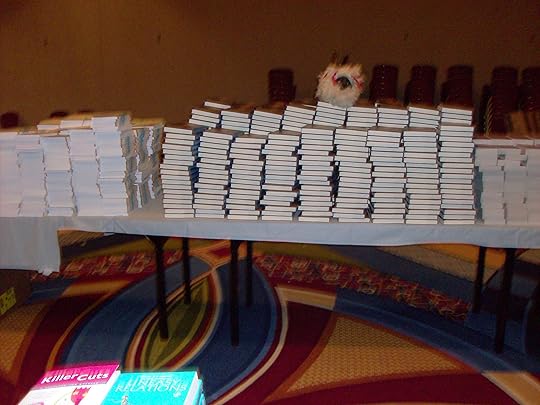
Stacks of books at Malice Domestic to be stuffed into convention bags
And what about the fun — for both author and reader — of signed books? In the e-book world, what can an author sign?
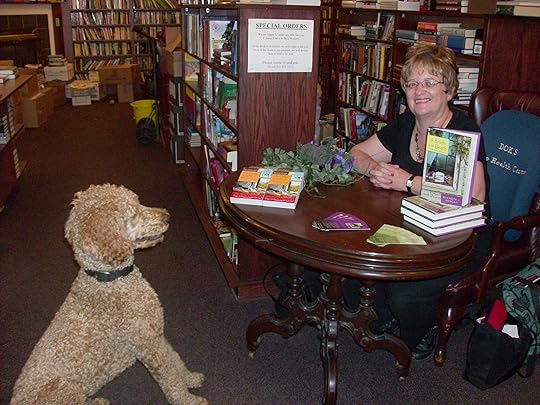
At book signing, Sleuth of Baker Street, with Percy, companion of store owner Marian Misters
It may be that once the entire book industry has been revolutionized and digitized until books and bookstores are gone, people will realize too late all that has been lost.
What would you miss most about a world without books?








January 5, 2011
Wales again, Week two
Week two of my winter visit to Wales is going much better than Week one. I seemed to have intense jet lag, chased by a nasty cold that came on very quickly. Energy level very low and wanting to sleep much more than usual. But I'm all better now and feeling right at home. I've been based in Llandudno and spending most of my time here, and in Conwy and Llanrwst. I had lunch last week with my friend Eirlys Owens in Llanrwst and an interesting American ex-pat, Sylvia Jones, who married a Welshman about seven years ago. Sylvia and I had been corresponding by e-mail, so it was great to meet her in person over a lunch of brie cheese and cranberry sandwiches at Badgers.
On Sunday, Eirlys invited me and her neighbours, Lois and Glyn Jones, to lunch at the Eagles Hotel. Lois is an ex-pat Canadian who married a Welshman many years ago. (That's two, so far!)
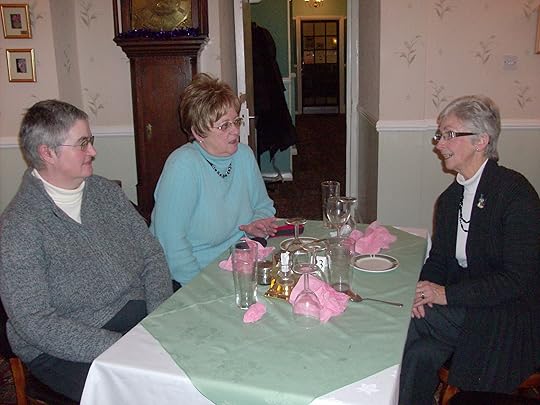
From left, Eirlys, me, Lois at Eagles Hotel lunch
That same evening, Sylvia Jones invited several of her friends and neighbours in for a get together. Of course, by the time we remembered to take a photo, almost everyone had gone home. (And she and her husband, Peter, met at Camera Club!)
One of the interesting guests was 86-year-old Mary Williams, who lives down the road. Mary published her memoirs this year, called A Cluster of Feathers. Sylvia, too, has published a book called No, I Live Here, about how she met and married Peter Jones, with lots of detailed descriptions of their travels around Wales. They have two delightful dogs, Jockan and Pip.
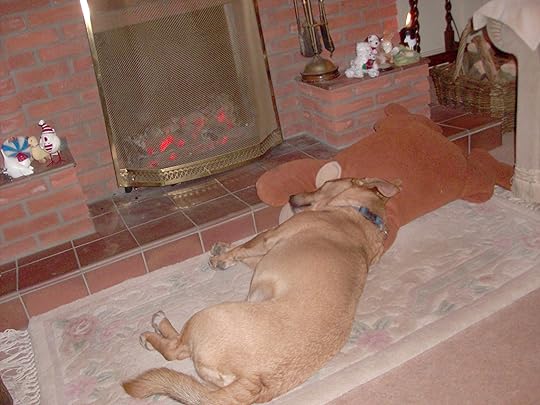
Jockan enjoys a snooze in front of the fire
They live in a house that Peter built, just outside Conwy, on a rural lane. In the kitchen is a Rayburn cooker. These are cousins of the Aga and are the neatest things. They burn coal, so they heat the kitchen. They have two or three ovens to cook in, they heat the water tank, and can boil a kettle faster than electric. Very British country house. I want one!
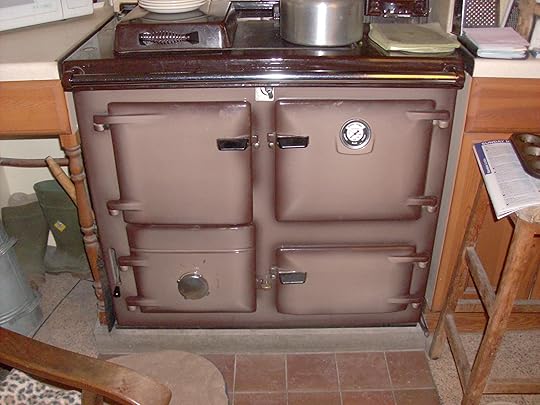
The Rayburn also dries clothes. There's a rack above it.
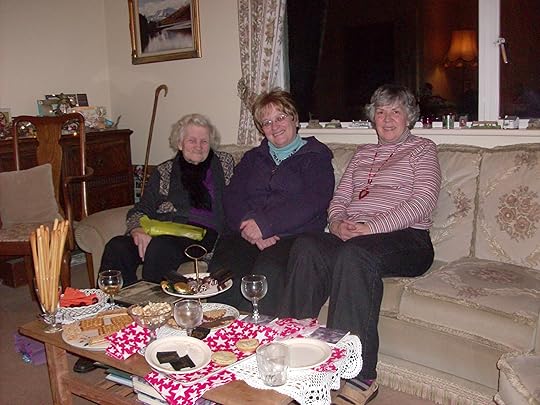
By the end of the evening there was just, from left, Mary, me, and Sylvia
Sylvia and I got together again a few days later for a walk near her home.
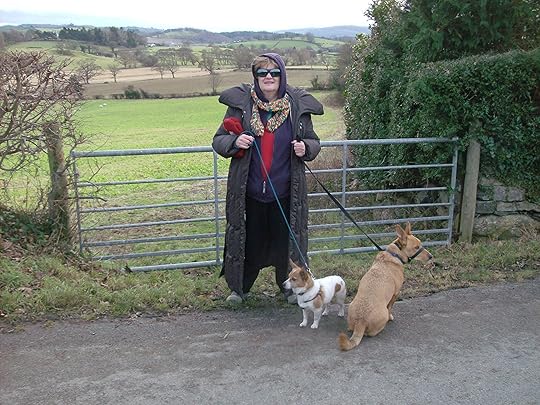
Dog walking in Wales with Jockan and Pip
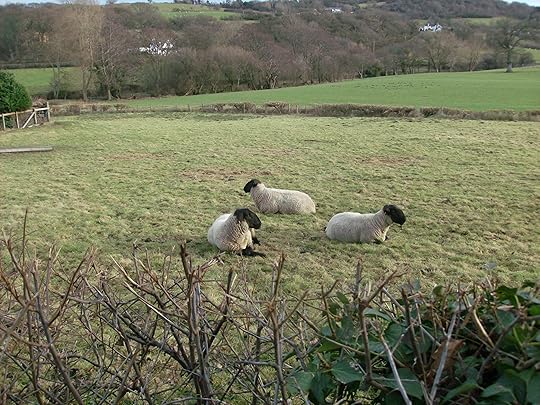
You'll see sheep on any country walk in Wales.
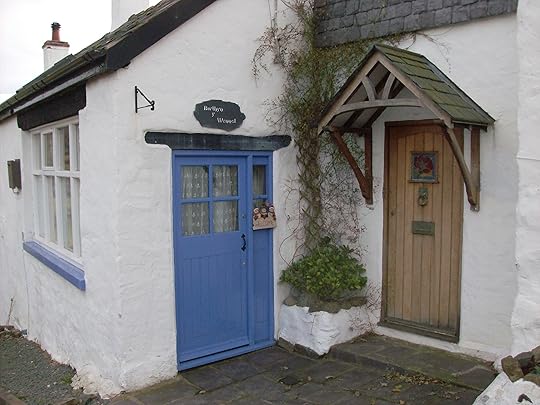
We passed these pretty doors on our walk.
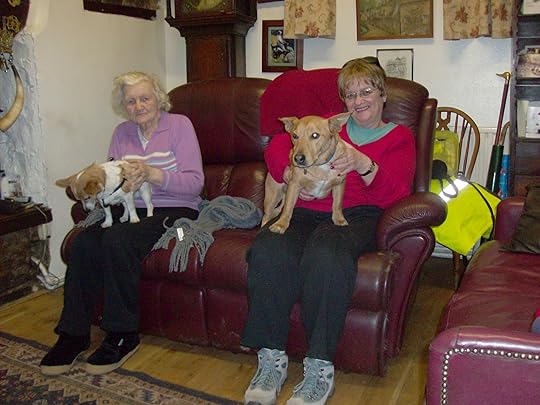
We ended our walk at Mary's charming 17th century cottage.
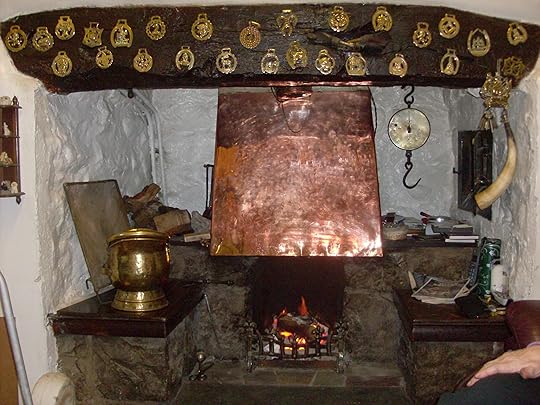
The fireplace in the cottage has a side oven where you can bake your bread.
So the days here in Wales have been filled with beautiful scenery and really nice people. But I've been doing other things, too. My agent sent a long list of suggested changes to the newest manuscript, due at the publishers at the end of January, so I've been working on that and keeping on top of my Humber duties, too.
Today I had a meeting with my new friend PC Chris Jones in Conwy police station. Chris gave me a behind the scenes tour of a modern UK police station. On the outside it's a Victorian police station, inside, it's a 21st century high-tech marvel.
Tonight is my last night in Llandudno. Tomorrow I go to Llanrwst to spend my last few days here with Eirlys. I have a surprise for her. It involves sausages.








December 27, 2010
Arriving back in Wales
I'm back in Wales and it's been a three-day event.
My son and I had dinner together before he dropped me off at the airport. Every time I go away I tell myself this time I'm going to travel light but there are Christmas presents to bring, a lap top, two weeks worth of clothes and of course, the books and magazines one needs for one's in-flight entertainment.
As you board and find your seat, you wonder who your fellow passengers will be. It's a strange thing, really, a group of random people coming together for this shared experience in close quarters and then dispersing at the other end, never to be seen again.
The overnight flight is long and tedious. Impossible to get comfortable. Too tired to read but can't sleep. You hang suspended in this non-waking, non-sleeping state, drowsily aware of things going on around you. You aren't really in the time zone you've left behind and your body certainly isn't in the time zone of the place you're going. On this flight, the crew did not dim the cabin lights during the try-to-get-some-sleep part of the program, so the waking state seemed to have the upper hand. The aircraft engines drone on. The person in the seat ahead is a recliner, so that invades my space, what little there is of it. Somehow, the hours pass, although you try not to look at your watch too often. And then we're on final approach into Manchester. We can see some snowy patches on the ground, but not a lot. It's a gloomy, grey, rainy morning. We shuffle off the plane and after a very long walk, enter the immigration hall. Some of us enter the non-EU line, British passport holders join the much-shorter EU line. (When I first started coming to the UK, it was Commonwealth and non-Commonwealth.)
So finally, after about half an hour, it's my turn to present my passport to the UK Border officer. He asks me what I'm doing in the UK. I tell him I write novels set in Wales and I come here twice a year. He looks at me and says, "I know you." I think, "oh, oh." He says I've checked you in before and then flips through my passport and shows me an entry stamp from a year ago. "That was me," he says. What an amazing memory. He must have met thousands of people, from everywhere, over the past year and he remembers me?
And it's on to the baggage hall, pick up my case and am on my way to the airport train station. There's been something funny going on with the Arriva Wales trains, industrial action, they call it, so no direct train from Manchester. I take the train into Manchester, find out what's happening, and am told to take the train to Crewe. Oh, and you'll have to hurry, it's leaving in three minutes the woman says, picking up what looks like an old-fashioned walkie-talkie. "I'll let them know you're coming." So off I hustle, with my bags, feeling disoriented and as if someone has been rubbing my eyeballs with sandpaper. I make the train. As soon as I board, it leaves.
At Crewe I have to lug my cases and bags, which are becoming increasingly heavy, to another platform where the train for Llandudno is about to leave. I climb on board and we're off to Wales! But I fall asleep and this time, in the non-waking, non-sleeping zone, the sleeping part is winning. I hear the announcements of the stations along the way, loving their familiar names … Flint, Prestatyn, Rhyl, Llandudno Junction, Llandudno.
The journey takes about two hours and we arrive at Llandudno, end of the line. I walk along the familiar High Street to my friends' house on Church Walks, but because of the cases, don't go into any of the shops. I'll be back later. The rain is falling harder now, cold and sharp. So I finally reach their home, climb the steps and the door opens to a warm welcome from my friends and their three noisy, affectionate dogs. I climb the stairs to my room overlooking the street, glad to be back. The heater is on, everything looks wonderful and one of the dogs, a pretty blue merle called Jasmine who reminds me of my Dolly back home, stays with me while I get settled in. I set up my laptop, check my e-mail, let son know I arrived safely, and then slide into the beautiful bed that awaited me at the end of a long journey. Bliss!
And now it's 3 a.m. on day three and I'm wide awake. Meeting Eirlys for lunch in Llanrwst. It'll be good to see her again and she's promising a surprise with a Royal connection!








November 28, 2010
The TBR list
If you're reading this, it's probably because you love reading as much as I do. The first place I ever went on my own, about aged seven, was the Peterborough Public Library. Books have always been an integral part of my life, and never more so than now, when I actually get to write them!
But the idea of what is a book is changing very rapidly as we make the transition from traditional paper- based books to electronic books designed to be read on hand held devices. I believe that Kindle, Kobo, iPad — whatever — is here to stay and the publishing industry knows it and so do we.
At first, I was reluctant to accept the electronic reader. I like the bookishness of books, the way they feel in your hands, the way they fit in your bag, the cover art, the feeling of satisfaction of turning the last page. But I thought perhaps I should get with the program and start using an electronic reader.
And then I realized I don't have to! My to be read list on goodreads.com has now reached 126 wonderfully exciting titles and I own most of them. Below, a few stacks of my TBR books. Other books, not even entered on the goodreads list, are scattered about in various bookcases. (And yes, I know. More bookcases required.)
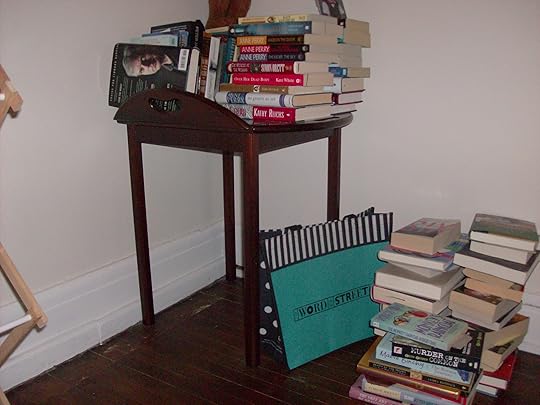
There are more books in the bag, borrowed from my friend, Marlene.
Last week I finally admitted I have a problem. I am almost powerless to resist the temptation of books, although this week I did go into two bookstores and came out empty handed but that was just because I didn't have my discount card on me. I rarely pay full price for a book. But the thing is, when I have all these books right here in traditional format, why would I buy them again in electronic format?
So I am putting off the decision on whether or not to buy an electronic book reader until I've read all the books I've already got. Let's do the math. Say I read two books a month (and that's about all I can manage with TV viewing, blogging, working full time, writing a novel, promoting my previous novels, dog walking) …hmm, 126 books divided by 24 books a year …that's five years and three months worth of reading lined up. And that's based on the highly unlikely premise that I won't buy another book in the next five years.
So for me, the decision has been easy. No e-reader. But make no mistake. I understand the benefits every time I lug another suitcase full of beautiful books home from the UK.








November 6, 2010
Special Offer
See the new appearances and promotions section for a special offer. Order now in time for Christmas delivery! We can include gift wrapping and gift tag and send directly to the lucky recipient's home!








October 25, 2010
The F-word
Call me old-fashioned, but I hate the way so many people, young and old, seem to be using the F-word in every sentence. It's used as a noun, a verb, and most commonly, as an adjective. I hear it on the streetcar when the person sitting behind me is talking on her cell phone. I hear it when a group of students passes me in the hall. I read it on a blog written by a mid-level crime writer. Not only do I find the word offensive — to me, it's like verbal littering — but I instantly think of the user as crude, common, vulgar and disrespectful of those around him or her. It seems that a lot of people use it without thinking and it has pretty much come to mean the same as "very".
At Bouchercon, a major North American crime writing convention that I attended recently in San Francisco, a writer who won an award in absentia had left an acceptance speech for the presenter to read in the event he (the writer) won the award. This particular writer did win and the presenter duly read the message to a ballroom full of sophisticated, middle aged, educated writers and readers. And every sentence contained at least one F-word. I was appalled and had I been the presenter, I would have refused to read such a vile, stupid acceptance message. The audience squirmed a little and cringed a lot. Did it have shock value? Probably, but so what? I did not catch the winner's name but that's fine as I have no desire to read his work.
When did the use of the F-word become acceptable in polite society? It used to be considered extremely strong language and as such, carried extreme weight. It would get your listener's attention. You recognized instantly that the person saying it meant business. Now, it means little or nothing because it is so overused.
I choose not to use it in the books I write because my characters don't need to say it. That's just not who they are. In most cases, I would not read a book in which the narrator or characters use the F-word. I would not find the characters likeable and would not care what they do or what happens to them. However, the exception to this is Stuart Neville's The Ghosts of Belfast. Some of his characters are former IRA killers and for them to use the F-word seems appropriate and acceptable. The word adds emphasis and meaning to the dialogue. I mentioned this to Stuart when I met him at Bouchercon. He said wait until you read (his second book) Collusion. A character in that book takes swearing to the level of a fine art. And I can't wait to read it because the brilliance of his writing overshadows everything else.
So I'm ok with the F-word sometimes. But just not when it's every other f-ing word.
And call me old-fashioned, but I can't even bring myself to spell it out!








October 15, 2010
Bouchercon – Day 4
Well, today, Friday, Oct. 15, it was time to get down to business. To do what I came to San Francisco to do, and that is attend the Bouchercon convention.
I started with a panel at 10 a.m. featuring a wonderful new writer I really admire, Stuart Neville, author of the award-winning The Ghosts of Belfast. Set in Northern Ireland in the present day, The Ghosts of Belfast tells the story of an IRA killer haunted by the ghosts of his 12 innocent victims. I remember the troubles, as they were called, because I was a CBC radio producer in London in the early 1980s and we covered the conflict between the Loyalists and the IRA. Neville captures the time so beautifully in his book and he was definitely one of the authors I was really looking forward to meeting at Bouchercon. He talked about how the foot soldiers, on both sides, were recruited from idealistic, unemployed youth who had nothing better to do. Belonging to the cause brought meaning and purpose to their days.
"People doing the killing and the dying, with the most to lose, gain the least when the conflict's over," he said at one point during the panel. He went on to discuss the role of guilt in his novels.
"Fegan (the protagonist) has knowledge of having done wrong and a desire to put that right," Neville said. "Guilt is a big part of the two books (including Collusion, the follow up to The Ghosts of Belfast). "When I write, I don't think, oh this guy's on the side of justice. I enjoy writing from the villain's point of view, to try to make him sympathetic to the reader. So it's not the sin that makes them different, it's the awareness of sin."
Other members on the Flags of Terror panel, moderated by Peter Rozovsky included Jassy Mackenzie, Cara Black, Lisa Brackmann, Henry Chang and james R. Benn. I'm looking forward to reading more of their work.
In the afternoon I attended another interesting panel. This one, featured first-time novelist Marcia Clark.
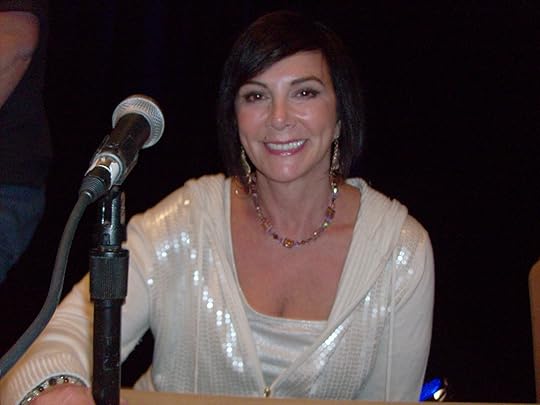
Marcia Clark looks great at Bouchercon
You'll remember her as the prosecutor in one of the most famous trials of the 20th century. And I liked that when it was her turn to speak, Marcia mentioned it right away, preventing it from becoming the elephant in the room.
"I always wanted to write," she said, "and as a prosecutor I felt I was doing something I believed in. I looked at it as defending the victims. But after the Simpson trial, I couldn't do it anymore. And I missed that life, with its sense of purpose and mission. So I thought, well, I can write a book." (She is also the author of a non-fiction book, Without a Doubt, about the Simpson trial.)
She describes her new novel, Guilt by Association, as "fiction, but true in an emotional sense. What it's like to be in a LA prosecutor's office."
Interestingly, Marcia was not appearing on a legal panel, but on a panelist composed of authors published by Mulholland Books, the new mystery imprint of Little, Brown. Her fellow panelists included Daniel Woodrell, Duane Swierczynski, Sebastian Rotella and Mark Billingham.
Her publicist very kindly gave me a copy of Guilt by Association and I can't wait to read it.








Elizabeth J. Duncan's Blog
- Elizabeth J. Duncan's profile
- 399 followers


